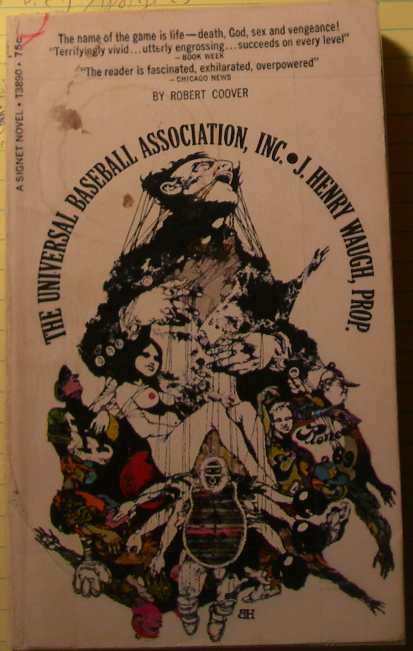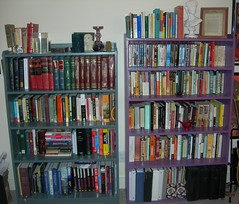Robert Coover, 1968
173pp
Read: 12/24/06 - 12/29/06
Know how you'll be reading a good book--typically this happens with the longer ones--and you're enjoying it, it really makes you think, etc., but when someone asks you what it's about, you're at an utter loss for a simple answer?
This book is the opposite. In an airtight, and surprisingly comprehensive nutshell: this book is about a middle-aged bachelor who escapes his otherwise tedious life by spending every free moment playing a dice-based baseball game of his own design. He keeps detailed statistics on a league full of imaginary players, and composes an elaborate league history. Having told you that, you've probably guessed about 80% of where this book goes: obsession, the human need to construct a narrative from a sequence of random events, the storyteller-as-God (I read somewhere that Waugh's name is supposed to be an expansion of the tetragrammaton, which if true is a nice touch), the creator's relationship to his creation.
Which whole thing made for a good premise for a short read, and anyway I was a few hundred miles from home and in need of reading material. I didn't develop any great expectations on the basis of this premise; mostly I was interested because I'd read The Public Burning a couple of years ago and was interested in getting another sampling of Coover's stuff. Even with tepid expectations, I was for the most part mildly underwhelmed. The premise was a little clever, and it was readable, and I was prepared for a book in which nothing much happens--that's sort of the point, innit?--but it nevertheless felt like the book's conflicts avoided their resolutions. The book's divided between Waugh's stagnant career & personal life, and the "action" in his imaginary baseball league. As a reader, I was never very invested in the players, and the ballplay dragged on. Come to think, that's arguably a testament to the book's fidelity to the game of baseball.
But then, in the end, a sort of a payoff. The last chapter is set in Waugh's "league," after the passage of one hundred seasons. Whereas the previous baseball action had been a celebration of nineteenth century baseball clubs and larger-than-life heroic players, the last chapter is peopled with their distant descendants, and the games have mutated into ceremonies in a religion based on the games of old. What's more, the previously un-showy narration has become a pitch-perfect (pundiferous!) imitation of Joycean wordplay and irreverence, complete with an Oliver St. John Gogarty figure. I was so pleasantly surprised by this last chapter that I'd probably say it was worth reading the entire preceding book (which was short, and not bad, mind you) just to get to this weird & unexpected finale.

I read a 1968 "Signet Novel" paperback, purchased for $1 at the bookstore at the back of the coffeeshop on College Ave in Ft. Collins, CO. I guess I'm sort of a fan of reading 1960s experimental fiction in the original paperback edition; for some reason it seems you can basically always find some Barth or Barthelme real cheap in any used bookstore, no matter where you are. I love reading an actual "literary" book that I can fit into my jeans' back pocket. Since these old paperbacks are usually on the verge of falling apart, I usually reinforce them by applying packaging tape to a book's spine & edges. This edition is notable for the naked woman who pops off its otherwise cluttered cover illustration. I assure you she is there out of strictly commercial consideration.

No comments:
Post a Comment